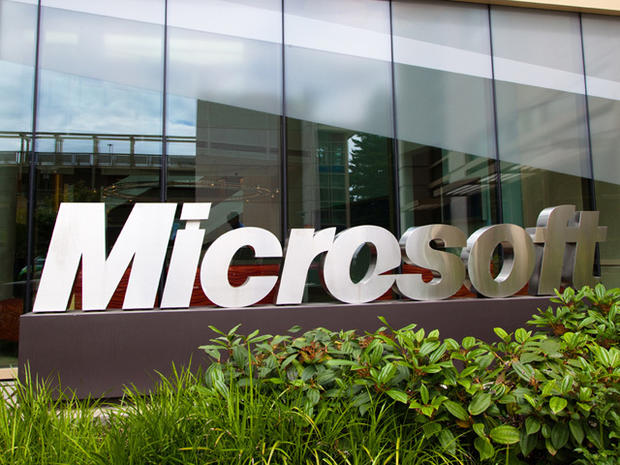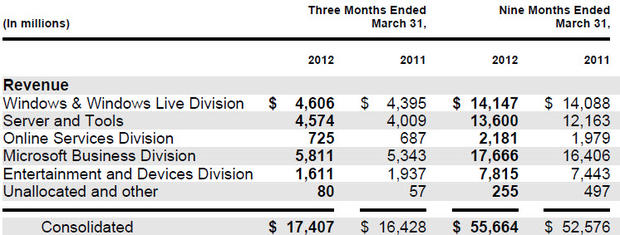What people don't get about Microsoft
(MoneyWatch) COMMENTARY Only yesterday, many pundits were just certain that Microsoft's (MSFT) latest earnings would disappoint. Profits were supposed to decline ... until they didn't.
Their surprise is unsurprising. That's because many of the people covering this sector, and Microsoft in particular, get taken in by grand-sounding themes. For example, digital tablets and smartphones will reign supreme, or Windows is doomed.
These themes have some truth, but only in the broader context of understanding how large corporations work when it comes to technology and how Microsoft has positioned its gear in people's homes.
Windows sales boost Microsoft earnings
Microsoft to release four versions of Windows 8
What if Microsoft made a Ford Mustang
Tablets will rule -- sort of
Much of the pessimism about Microsoft's prospects come down to the so-called consumerization of information technology. Under this view, people will boldly adopt mobile devices en masse and force corporations to change their tech strategies.
There is something very real in this observation. PCs will lose their computing primacy because most people don't need the full power of a PC. Have a doubt? Buy a tablet or smartphone and give it a try. The light weight becomes addictive, and the form factor works for many applications -- these devices are superior for a good number tasks and adequate for many more. Add a good docking station and you can even do longer form writing, a weak point for tablets. Just checking email or social networks? A smartphone may be all you need.
PCs won't disappear anytime soon
But when it comes to work, you need to get 100 percent of it done, not the 80 percent of the 80-20 Pareto rule. And enterprise-sized businesses (and even a lot of small to midsize ones) still have a major Windows bias. It's how they've designed applications and data access.
That will change, but only over a long period of time because IT departments don't have the personnel or budgets to rip out the old and replace it with a new approach. Particularly when you consider how long it takes to safely and predictably roll out new systems. It's exactly the reason that Internet Explorer has held on for so long. There is inertia in business risk management and mitigation.
Ironically, Apple (AAPL) uses the same basic strategy in a different way. One big business reason to so closely control its iPhone and iPad iOS ecosystem is to make it difficult to move content to a competing platform. It's inertia by inconvenience.
Stealth competition
Also, Microsoft isn't exactly standing still. Consider how the company allowed a virtualized Windows on an iPad service.
Ultimately, Microsoft just wants to license stuff. If it's easier for a company to use virtual versions of Windows running on an iPad to enable the corporate applications on the world's (currently) favorite tablet, so much the better for management back in Redmond, Wash. So long as they get revenue from whatever is being done, Microsoft is happy.
Then there are the purportedly secret plans to fill the market with Windows 8 tablets that run from $300 to $1,000. On the low price end, that could do a lot. The upper part of that range sounds ridiculous, but you have to wonder what features those devices ultimately might have that could push prices up that high. Maybe a combined tablet and docking station that can act like a tablet or a notebook? Whatever it is, figure on a high-end device targeted squarely at particular corporate needs that a regular tablet can't handle.
Don't just look at the client
Focusing this much on the client, though, extends the mistake that many make. Stop looking at the end point and start looking where else the company brings in money. Here's the revenue breakout by division:
Making the discussion primarily about Windows on PCs is a mistake. Windows server and associated back-office software tools have grown almost as large as the Windows client portion. The business division is bigger than either of them.
Although still heavily reliant on old lines of business, Microsoft is more diverse than people realize. Plus, all those tens of millions of Xbox 360s in people's homes create a beachfront for personal entertainment that not even Apple can rival (for now). Today, Xbox owners use the consoles more to watch TV and movies and listen to music than game online.
Does Microsoft have some enormous long-run problems in the way markets are shifting? Absolutely. But as entertaining it may be to sound the company's death knell, it's premature to write the epitaph for a historically vital company that for decades has shown its ability to compete.

